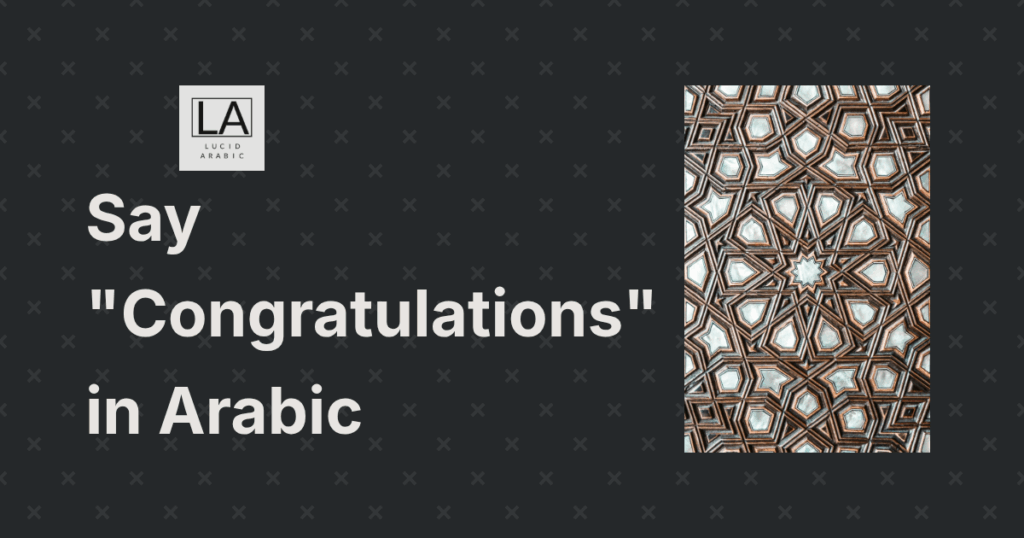Spread Joy and Positivity: Learn How to Say “Congratulations” in Arabic 🎉
Few words carry as much happiness and warmth as “Congratulations.” Whether it’s for a wedding, a new job, a graduation, or even a new baby — sharing in someone’s joy builds lasting bonds. In Arabic, saying “Congratulations” is more than a polite expression — it’s a heartfelt wish for continued blessings.
Let’s explore how to say “Congratulations” in Arabic, understand its cultural importance, and discover variations across the Arab world!
The Arabic Word for “Congratulations”
The most common Arabic expression for “Congratulations” is:
👉 مَبْرُوك (mabrōk)
Pronunciation: ma-brook (rhymes with “look,” but with a slightly rolled “r”)
You can also say:
👉 أَلْف مَبْرُوك (ʾalf mabrōk) – literally “A thousand congratulations!”
It’s a warm, enthusiastic way to express happiness for someone’s success or blessing.
The Meaning Behind “مَبْرُوك”
The word مَبْرُوك (mabrōk) comes from the root ب ر ك (baraka) — the same root that gives us بَرَكَة (barakah) meaning blessing.
So, when you say مَبْرُوك, you’re not just congratulating someone — you’re wishing them blessings! That’s what makes this word so special in Arabic.
It’s not just “Well done!” — it’s “May this good thing be full of blessings for you.” 🌸
Pronunciation Guide
Let’s make it simple to pronounce:
- مَ (ma) – like “ma” in “mama”
- بْ (b) – a short “b” sound
- رُو (roo) – roll the “r” lightly, say “roo”
- كْ (k) – soft “k” sound
Altogether: مَبْرُوك – mabrook
Say it with a smile, and it’ll sound perfect!
Variations Across Arabic-Speaking Countries
Arabic is wonderfully diverse, and the way people say “Congratulations” changes slightly depending on where you are.
🇪🇬 Egyptian Arabic
- مَبْرُوك (mabrook) – most common and widely used.
- Often followed by اللّه يِبَارِك فِيك (Allāh yibārik fīk) – meaning “May God bless you too!” (as a reply).
🗣 Example:
- مَبْرُوك عَلَى الشُّغْل الجَدِيد!
Mabrook ʿalā ash-shughl al-jadeed!
→ Congratulations on the new job!
🇱🇧 Levantine Arabic (Lebanon, Syria, Jordan, Palestine)
- Same expression: مَبْرُوك!
- You’ll often hear the reply: الله يْبَارِك فِيك (Allāh ybārik fīk).
🗣 Example:
- مَبْرُوك عَالتَّخَرُّج!
Mabrook ʿa-t-takharruj!
→ Congratulations on graduating!
🇲🇦 Maghrebi Arabic (Morocco, Tunisia, Algeria)
- مَبْرُوك (mabrook) is also used, but sometimes people add:
عْلِيك (ʿlik) – meaning “to you.”- مَبْرُوك عْلِيك! (mabrook ʿlik!) – Congratulations to you!
🗣 Example:
- مَبْرُوك عْلِيك العُرْس!
Mabrook ʿlik al-ʿurs!
→ Congratulations on your wedding!
When to Use It
You can use مَبْرُوك for many joyful occasions:
🎓 Graduation:
مَبْرُوك عَلَى التَّخَرُّج! (Mabrook ʿalā at-takharruj!)
Congratulations on graduating!
💍 Wedding or Engagement:
*أَلْف مَبْرُوك عَلَى الزَّوَاج! (ʾAlf mabrook ʿalā az-zawāj!)
A thousand congratulations on your marriage!
👶 New Baby:
*مَبْرُوك عَلَى الْمَوْلُود الجَدِيد! (Mabrook ʿalā al-mawlūd al-jadeed!)
Congratulations on the new baby!
🏆 Achievement or Success:
*مَبْرُوك عَلَى النَّجَاح! (Mabrook ʿalā an-najaaḥ!)
Congratulations on your success!
No matter the situation, مَبْرُوك brings a smile and positive energy.
A Fun Fact: “Mabrook” and “Barakah”
Here’s something beautiful: the same Arabic root بَرَكَة (barakah) appears in the greeting تَبَارَكَ الله (tabāraka Allāh) – “Blessed is God.”
This means the word مَبْرُوك carries a touch of divine blessing. When you say it, you’re essentially spreading barakah — good fortune, luck, and happiness.
In fact, in older Arabic poetry, people used to say بُورِكَ لَكَ (boorika laka) – “Blessings upon you.” That expression slowly evolved in daily life into مَبْرُوك — shorter, friendlier, and just as powerful.
The Origin of Muslim Aid and the Spirit of “Mabrook”
While not directly linked linguistically, Muslim Aid embodies the same compassionate energy found in مَبْرُوك. It was founded with the mission to bring relief and blessings — barakah — to people in need.
In Islam, sharing in others’ happiness or hardship is part of faith. The Prophet Muhammad ﷺ said:
“The believers are like one body; when one part feels pain, the whole body feels it.”
When you say مَبْرُوك, you reflect this same empathy — rejoicing for others as if their happiness is your own.
Practice Tip: Make It Part of Your Conversations 🌟
Here’s how you can practice using مَبْرُوك naturally:
- Comment on social media posts – When your Arabic-speaking friend shares good news, write: مَبْرُوك! 🎉
- Pair it with emotion – Say أَلْف مَبْرُوك! (ʾAlf Mabrook!) with a big smile.
- Learn the reply – When someone congratulates you, respond with: اللّه يِبَارِك فِيك (Allāh yibārik fīk) – May God bless you too!
🗣 Try these examples:
- مَبْرُوك عَلَى البَيْت الجَدِيد!
Mabrook ʿalā al-bayt al-jadeed!
→ Congratulations on the new house! - أَلْف مَبْرُوك عَلَى التَّرْقِيَة!
ʾAlf Mabrook ʿalā at-tarqiyah!
→ A thousand congratulations on the promotion!
Why “Mabrook” Feels So Good to Say
Words have energy — and مَبْرُوك radiates positivity. Saying it reminds us to celebrate others’ happiness, which in turn brings joy to our own hearts.
In Arabic culture, sharing someone’s good news is a form of respect and love. Whether you whisper it softly or shout it joyfully, مَبْرُوك is always a word that spreads light.
Conclusion: A Small Word with Big Blessings 🌸
From Egypt to Morocco, from weddings to graduations, مَبْرُوك is one of the most beautiful Arabic expressions — full of warmth, blessing, and sincerity.
So, next time you hear good news, share a smile and say it proudly:
مَبْرُوك! 🎉

